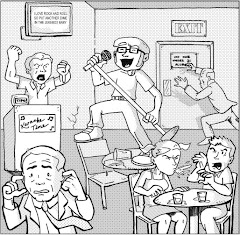The Detective #1, September 1999, Sunset Strips Publishing
writer/artist: Goff
colorist: Jose Grandmont
dialogue assistance: David Jackson
book design & color separation: Sunset Strips Studios
I was really disappointed in the recent "Resurrection of Ra's Al Ghul" crossover that plagued the Bat-family books this holiday season. Batman's global pursuit was three issue's worth of adventure prolonged in seven, and Robin's internal struggle with the Demon Head's offer to join him and resurrect his parents was predictable, useless page filler. I was actually very pleasantly surprised with Paul Dini's epilogue in the latest Detective Comics; the one-issue wrap-up was more clever and fulfilling than the entire preceding arc, mostly because Batman actually used his detective skills to track and subdue Ra's. Writers often forget that Batman's mind is as powerful as his body, and when they remember, we readers are often so denied the Dark Knight's process that he comes off like some know-it-all (or "Bat-God," as I've read on some message boards). Sure, the guy wears a cape, but Batman was forged in the fires of 1930s detective pulp fiction, combining that fantasy of Superman's genre-creating appeal with the standards of those oversized pulps.
Enter Sunset Strip's The Detective, an obvious homage to those gumshoe magazines of yesteryear. Writer/art Goff (no other name is given) masterfully crafts a complicated tale of uncanny intrigue, capturing the oddities of human behavior and greed -- hallmarks of those old window-blind-shaded tales. In The Detective #1, Charlton, a reporter eager for a story, scours the morgue and discovers the possible corpse of Max Faccioni, famous detective, which inspires him to recount an old kidnapping case. When a boxer thinks his girlfriend has been kidnapped, he considers throwing the fight to get her back, but Faccioni finds her in hiding, disgusted with her man's masochism. When the flashback ends, we discover that the body wasn't Faccioni's, but Charlton has written his article anyway . . .
. . . which attracts the attention of a mysterious benefactor who hires Charlton to discover Faccioni's real fate. Charlton hits the history books and uncovers a case about two old British soldiers that have begun terrorizing each other after their mutual guilt for a military crime. When Faccioni realizes that one soldier's butler was an inside man for the other, all hell breaks lose, including a merciless hurricane that claims the betrayer's life. This case is much more convoluted than the boxing caper, and I felt like a detective trying to decipher its less than linear flow, but Goff offers a poignant ending that almost makes up for it. We don't see Charlton again, but I assume his investigation of Max Faccioni drives this twelve issue miniseries to its conclusion.
Artistically, Goff effectively captures the mood of the pulp era detective stories that undoubtedly inspired him, from the just-so hooked nose of his trenchcoated detective to the charming imperfections of his hand-written lettering. His characters look stock, like they've been removed from a paper doll cut-out book of old detective archetypes, with similarities to modern masters Eduardo Barreto or Graham Nolan, and his black, white, and red coloring offer just the right amount of mood. Red is indeed the ideal shade, capable of capturing both the passion of that boxer's dame and the violence of that last story's hurricane. My only qualm with Goff's visuals is its dire consistency; bouncing back and forth from Charlton's 1984 to Faccioni's presumably Big Band era, I actually hadn't realized how I'd been shifted in time until I went back to catch a caption I'd missed. Again, I felt like a detective myself, which might have actually benefited the issue, since then I could sympathize with Faccioni's frustration . . .
Overall, The Detective #1 was a delightful blast to the past, and a fun departure from the trappings of conventional comic book storytelling. Though the connection to our modern understanding of Batman is thin, considering my recently mixed feelings about the Ra's resurrection, I was grateful for Goff's grounded take on the gumshoe paradigm. Max Faccioni is easily capable of following a Dark Knight adventure in Batman's native Detective Comics title and in fact might support that title's namesake more than the Caped Crusader. With guys like Goff around, "the detective" as the world once knew him, like Ra's Al Ghul, will never die.
Tuesday, January 08, 2008
The Detective #1
Subscribe to:
Post Comments (Atom)



No comments:
Post a Comment